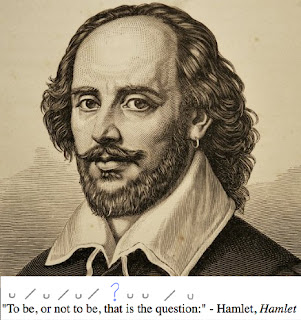15 Little Words Every Shakespeare Reader Should Know (with Examples)
Brush up on your Shakespeare vocabulary with these fifteen words every Shakespeare reader should know! Each word is accompanied by its part of speech, a simple definition, a hyperlink to the Oxford English Dictionary definition, and an example from one of Shakespeare's plays. Note that some of these words can have multiple meanings (sometimes including the modern meanings), but here are the most common meanings used in Shakespeare.
1) Wherefore (adverb) = why
"O Romeo, Romeo, wherefore art thou Romeo?" - Romeo and Juliet (II.2)
2) Want (noun) = lack
"My blood, my want of strength, my sick heart shows." - Henry VI, Part 3 (V.2)
3) An (conjunction) = if, even if
"an I should live a thousand years, I never should forget it" - Romeo and Juliet (I.3)
4) Sooth (adverb) = truly
"No, sooth, sir." - Twelfth Night (2.1.9)
5) Dear (adjective) = dire, grievous, hard
"Would I had met my dearest foe in heaven" - Hamlet (I.2)
6) Fact (noun) = evil deed, wicked act, crime
"Nor did he soil the fact with cowardice" - Timon of Athens (III.5)
7) Fancy (noun) = love, infatuation
"who can find the bent of woman's fancy?" - Two Noble Kinsmen (IV.2)
8) Choler (noun): anger, rage, wrath
"Must I give way and room to your rash choler?" - Julius Caesar (IV.3)
Note: Choler is one of the four humours. To find out more about how the Elizabethans believed humours affected human temperament, check out our post on the Great Chain of Being.
9) Silly (adjective) = helpless, defenseless, vulnerable
"shepherds looking on their silly sheep" - Henry VI, Part 3 (II.5)
10) Anon (adverb) = soon, shortly, presently
"I told your grace they would talk anon." - Henry VIII (I.4)
11) Undone (adjective) = ruined, destroyed
"You have undone a man of four score three" - The Winter's Tale (IV.4)
12) Wont (verb) = to be accustomed to, to be in the habit of
"When were you wont to use my sister thus?" - The Comedy of Errors (II.2)
13) Owe (verb) = own
"Fate, show thy force. Ourselves we do not owe: what is decreed must be; and be this so!"
- Twelfth Night (I.5)
14) Pate (noun) = head, skull
"You have broke his pate with your bowl" - Cymbeline (II.1)
15) Wench (noun) = woman, girl
"Foolish wench!" - The Tempest (I.2)



Comments
Post a Comment
All comments are moderated by the Green-Eyed Blogger to avoid spam. If you do not see your comment right away, do not worry; it is simply undergoing our routine moderation process.